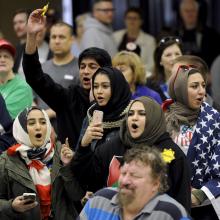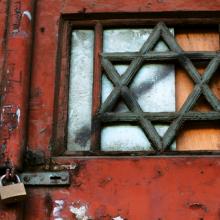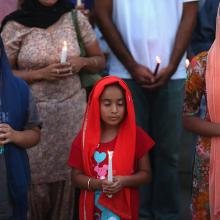Religious discrimination
On April 18, the court heard oral arguments in Groff v. DeJoy, a case addressing an employer’s obligation to accommodate religious employees’ requests under federal law. The dispute involves a Christian postal worker who quit his job and sued the U.S. Postal Service after he was unable to find coverage for his Sunday shifts. Current law requires employers to make accommodations for workers’ religious requests only if doing so doesn’t impose more than a minimal cost on their business, known as the “de minimis” standard.
After listening to the oral arguments in the case, I believe it’s very likely the court will overturn the de minimis standard and require employers to accommodate more religious requests.

Image via Shutterstock/Joa Souza
Persecution of these Afro-Brazilian religions, whose adherents are largely poor black Brazilians, has been around since at least the 19th century.
Patrick Murphy's execution was again halted Thursday because Texas death row inmates' final access to spiritual advisors of their faith differs for Christians and Buddhists. Murphy, a 58-year-old Buddhist, is one of two surviving members of the infamous "Texas Seven," a group of escaped prisoners who committed multiple robberies and killed a police officer near Dallas in 2000 during more than a month on the run. Four others have already been executed, one killed himself when police caught up to them in Colorado, and one other remains on death row with Murphy.
Seeing the parallels between Micah’s time of unease and ours, it would behoove us to lean in for a listen when Micah writes, “He has shown you, O mortal, what is good. What does God require of you? That you act justly and love mercy and to walk humbly with your God.” (Micah 6:8)
True, the executive order, which includes a restriction on travel to the U.S. for nationals of seven Muslim-majority nations for 90 days, does not directly refer to followers of Islam. But that doesn’t mean it’s not aimed at them, critics say.
Huston Smith, the man who helped the world understand other faiths, perhaps more than almost anyone else, died on Dec. 30 at age 97.
I first learned of it when my oldest sister, who lives in Berkeley, Calif., not far from Huston and Kendra Smith, sent me a note saying he had breathed his last about 7:30, the morning of Dec. 1, at his Berkeley home.
I was surprised that it took until Jan. 1 for a news story to show up about the death of this remarkable religion scholar.

Image via miker/Shutterstock.com
"When we allow one faith community to be targets then we open the doors for others to be targeted. I believe the worst is yet to come unless more people actively intervene with their voices, their votes, and in public acts of solidarity with their Muslim neighbors."

Image via REUTERS/Dave Kaup/RNS
This election season, Muslims face a slate of Republican candidates who demand curbs on immigration and compete over how tough they’d be on Islamic terrorism, if elected. But a new survey finds U.S. Muslims are looking at American society and its future much the same as their non-Muslim neighbors. Like non-Muslims, the economy is their top concern. They are engaged in community life, and share similar attitudes on several significant issues.
America is a nation established on certain inalienable rights. The right to life. The right to liberty. The right to pursue happiness as one sees fit. The right, as a religious organization, to sue a government and its officials whenever you don’t get what you want.
You may not remember that last one from social studies class — and to be honest, I don’t recall Jefferson expounding upon it, either — but it is nevertheless a right the fundamentalist group Answers in Genesis and its president, Ken Ham, availed themselves of last week with the announcement of their forthcoming lawsuit against the state of Kentucky, its governor, and its tourism secretary.
The kerfuffle is over AiG’s Ark Encounter — the “creationist theme park” complete with a 510-foot wooden replica of Noah’s floating barn (except this one won’t float, plus it costs 70 million bucks) — and specifically, the $18 million in special tax incentives the Commonwealth’s tourism department had initially approved in 2011 before retracting them last year.
The goal of the incentives is to promote the construction of job-creating tourist attractions in Kentucky, and AiG’s project initially held water. What caused it to fall out of favor with the Bluegrass State was the group’s increasingly vocal insistence that it intended to: 1) require its employees to sign a statement of faith affirming, among other things, their devotion to the idea that the universe was created sometime more recently than the invention of beer by the Mesopotamians, and 2) operate the park pretty much like its Creation Museum — i.e., as evangelistic outreach.
One of the toughest political calculations in Washington is balancing competing claims of gay rights with the traditional prerogatives of religious freedom. After a number of setbacks on that front, President Obama may have finally found a small patch of middle ground with Monday’s move to bar federal contractors from discriminating on the basis of sexual orientation.
Yet Monday’s action also leaves in place a 2002 order signed by President George W. Bush that gives religious groups with federal contracts some leeway by allowing them to use religious beliefs as a criterion in making hiring and firing decisions; as a candidate in 2008 Obama pledged to overturn that exemption.
At the same time, Obama did not expand the exemption to explicitly allow religious groups that receive federal funds to use sexual orientation as grounds for hiring and firing, as some demanded.
Abercrombie & Fitch will change its “look policy” and allow employees to wear hijabs after a three-year legal battle with two Muslim women was settled out of court.
The settlement requires Abercrombie to report religious accommodation requests and discrimination complaints to the Equal Employment Opportunity Commission for three years, and includes $71,000 in compensation for the two women. The settlement also averts a Sept. 30 trial.
Abercrombie fired Umme-Hani Khan, a stockroom worker in its San Mateo, Calif., store, in 2010 for refusing to work without her religious headscarf. Khan, who had worked at the store for four months without incident, filed a religious discrimination complaint with the EEOC, which sued the retailer in 2011.
The British government plans to investigate whether other Jews were denied employment benefits after an Orthodox Jew who refused to work on the Sabbath won a landmark appeal.
Jacob Slinger, a 19-year-old who lives in Greater Manchester, won an appeal against the Department of Works and Pensions after he’d been denied a jobseeker’s allowance of 56.80 pounds ($86.67) a week because he refused to work on Saturdays. He told the tribunal he had to rely on the generosity of his grandmother to survive.
After listening to his case, tribunal judge David Hewitt ordered the DWP to pay Slinger 1,500 pounds ($2,288) in benefits and called on other Jewish people who had been denied benefits to come forward.
Pakistani President Asif Ali Zardari has appointed a three-member Senate committee to look into reports that nearly 250 Hindus have fled to neighboring India to escape harassment and discrimination.
The panel is meant "to instill a sense of security" in the Muslim-majority country's Hindu minority, according to The Times of India. According to reports, Hindus from troubled Balochistan and Sindh provinces traveled to India on 30-day pilgrim visas granted by the Indian government.
Pakistani officials detained the Hindus at the border for hours on Aug. 10 and made them sign declarations that they would return to Pakistan.
First, there were the cryptic news bulletins on TV. There had been a shooting at a Sikh temple in a Milwaukee suburb called Oak Creek. Then the details began to emerge. Six people were dead, others critically wounded, including a police officer. The shooter, who had a long history with the white power movement, was shot dead by another police officer, bringing the toll to seven.
And all around Wisconsin, people watched in horror as we learned of yet another mass murder, this one in our backyard, this one shattering the tranquility of a Sunday morning worship service.
There are not a lot of Sikhs in Wisconsin – about 3,000 in the southeastern part of the state, perhaps 250 or so in the Madison area where I live. Yet people everywhere shared the horror and the sadness of that moment.
In the Milwaukee area, a group called the Light Brigade — which had held up illuminated letters with political slogans during the effort to recall Gov. Scott Walker earlier this year — stood in Cathedral Square with a simple, powerful message in lights: “Wisconsin Weeps.”
For more than a year, Prudhomme’s Lost Cajun Kitchen in Lancaster County, Pa., has offered a Sunday special: Diners who bring in a current church bulletin receive 10 percent off the purchase of their dinners.
But the promotion rubs some people the wrong way, including John Wolff an atheist and member of the Freedom From Religion Foundation.
Wolff, a Lancaster resident who said he's never been to Prudhomme’s, recently filed a complaint with the Pennsylvania Human Relations Commission claiming the 22-year-old restaurant should not give discounts based on religion. “I bear them no ill will," he said, "but they shouldn’t be pushing religion."
My friend April grew up a church girl. She attended Bible camp and Sunday school, sang Christian songs, and went on mission trips.







![Abercrombie & Fitch Logo. Via RNS/courtesy Jaime Berrezueta [Public domain], via Wikimedia Commons](https://sojo.net/sites/default/files/styles/medium_square/public/blog/Abercrombie_Logo.jpg?itok=E3A3Rx9r)

